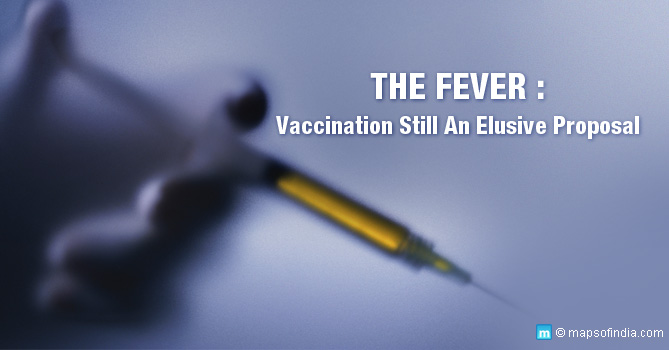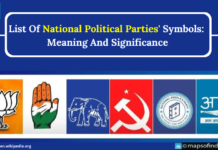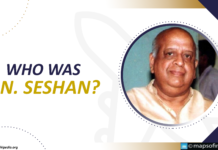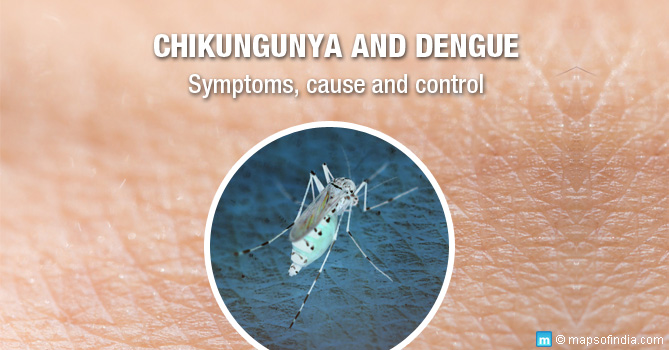Dengue fever is an infectious tropical fever (also known as the breakbone fever), caused by the Dengue virus transmitted through the bites of the Aedes species of mosquitoes especially Aedes aegypti. The symptoms of this disease may range from fever, headaches, muscle and joint pains and sometimes skin rashes to bleeding, leakage of blood plasma and a rapid fall in the platelet count of the blood (Dengue Hemorrhagic Fever) to abnormal drops in the blood pressure (Dengue Shock Syndrome), depending on the acuteness of the disease. Both the Dengue Hemorrhagic Fever and the Dengue Shock Syndrome may prove to be terminal. Since the Second World War, Dengue has become a global threat. While a cause for a high rate of child mortality, Dengue has become a primeval disease in more than 110 countries. The Dengue Virus has four different strains, Dengue Viruses-1-2-3-4. Till date there is no proper therapy for this tropical disease and researches for the development of a vaccine for the said disease has been ongoing for the last five or six decades. It is evident that the discovery of an effective vaccination will be a major step in arresting this global threat.
Recent breakthroughs in the development of the Dengue Vaccination program-the efforts of the International Center for Genetic Engineering and Biotechnology (ICGEB):
In what seems to be a major breakthrough in the attempts of developing a vaccine for the Dengue fever, International Center for Genetic Engineering and Biotechnology (ICGEB), Delhi has isolated a vaccine that might be an effective measure to contain this rapidly spreading disease. The vaccine has been developed based on the same technological approach as that of the Hepatitis B vaccine. Regarding the non infectious vaccine (still in the developmental stage), Professor V.S. Chauhan, the director of the Delhi branch of the institute commented, “We looked at the structure of the virus and from that structural information we were able to remove what we call the ‘business end’ of the virus for immune protection. So we pulled out these small stretches from the outside structure of the virus- the business end and stitched them together. So when we stitched them together and put them in animals to look for immune responses, and we were happy to see that we got a good response to all the four viruses and none of them were depressed. But you’ll appreciate that working in animals is one thing and working in humans is totally different”. As confirmed by Dr S Swaminathan (one of the pivotal members of the Dengue vaccine development program), the efficiency of the vaccine only becomes credible after proper clinical tests has been conducted.
Professor Chauhan underlines that the approach of the ICGEB in the vaccine development project is unique and since the research team is working with all the four types of viruses, the successful development of such a vaccine will in fact be a contribution to the world. However, he also confirmed that a proper clinical test on a human subject is not probable in the next five years as the vaccine is still in the developmental stage. But he seems to have accepted the challenge of the Dengue viruses and as per his estimation it is not impossible to develop a vaccine against this widespread mosquito borne tropical disease.
The Eliminate Dengue Research Program:
The Eliminate Dengue Research Program is a currently a research and developmental program with a completely different approach. Instead of concentrating on developing a vaccine for human subjects, this program aims at developing a vaccine for the mosquitoes which will marginalize their capabilities of transmitting the disease. The said nonprofit program is currently underway in countries like Australia, Singapore, China, Brazil, Columbia, Vietnam and Indonesia. Under this research program, the carrier mosquitoes have been transfused with the Wolbachia bacteria (isolated from the fruit fly) and researches have proved that the carrier mosquitoes are practically impotent in transferring the virus when this bacterium is present in their system. The scientists of the said program are considering this discovery as a low budget solution to arrest the widespread tropical disease. While the solution is environmental friendly, such transfusions can also be disseminated covering large areas.
Efforts of the Koch Institute of Integrative Cancer Research under Massachusetts Institute of Technology (MIT) in developing Dengue vaccine:
Developing a vaccine is a tedious and time consuming process, especially complicated for the Dengue viruses because of the presence of four serotypes, all of which are prevalent in an affected area. In an effort to define a vaccine that will effectively neutralize all the four serotypes, the researchers of the Koch Institute of Integrative Cancer Research under Massachusetts Institute of Technology (MIT) are concentrating on yet another approach of developing a vaccine involving the mutation of antibodies. Under this project, the part of the virus that is actually functional in causing and spreading the infection– the envelope protein, is under observation. According to Ram Sasisekharan, Professor, Biological Engineering, MIT, “This is a very critical protein that allows the virus to latch on to the appropriate receptor within the host, to infect them, replicate and spread”.
The research team under Professor Sasisekharan focused on the A segment of the envelope protein and planned to isolate the antibodies that attack the said strand of protein. However, further researches revealed that in spite of the high potential of the said antibodies, they are unable to countermand all the four types of Dengue viruses. The antibody chosen as the working model (4E11) was found to effectively counter the first three serotypes but not the fourth. Keeping in mind the complex process of the antibody- antigen reactions, which involves chemical processes like hydrogen bonding and ionic bonding, the researchers finally arrived at the possible changes they have to implement in order to bolster the effectiveness of the 4E11 antibody in combating all the four serotypes, especially the fourth serotype. Results indicated that 87 probable changes (mutations) were viable and further studies constricted the probabilities to only 10.
Dengue spreading as epidemic in Delhi
Dengue is creating a menace in Delhi with the death toll reaching to 22 as of 21 September 2015. Although the civic authorities are yet to finalise the official figures which stands at five, 22 casualties have been reported in the state. As per media reports, a large number of people are flocking the hospitals to get tested for dengue or admitted to hospital due to fever. More than 2,000 dengue cases have been reported in 2015 by 21 September 2015. The civic authorities are undertaking special preventive measures to control dengue but the Delhi people are feel that the worst outbreak of the disease displays the ill-preparedness of the MCD to deal with the menace. To fight the disease, the Delhi government has ordered top convert 55-government run dispensaries into ‘Fever and Dengue Clinics’ which will operate from 7 am to 9 pm an all seven days including holidays.
Recent Updates
- Serum Institute, a pune-based firm is all set to develop a biologic drug which will treat all four strains of dengue virus. The firm is applying to the Ministry of Science and Technology for a fast track approval so as to roll out a treatment for the disease in the country. The cost of the injection would be between Rs. 5,000 – Rs. 10,000 for a single dose.
Conclusion:
As mentioned before, the synthesis of a viable vaccine for all the four types of dengue viruses is a complicated task. While the scientists all over the world are tirelessly pursuing the research for the development of the said vaccine taking into account all the angles, India tops the list of the Dengue affected countries, with 37000 cases of Dengue infection reported in 2012, the highest in the world. Even the scientists of the Eliminate Dengue Research Program visited India to seek a partnership in the ongoing researches and to find out if their research results could be of any help to the highest Dengue affected country. Dengue is the second most widespread mosquito borne tropical disease after Malaria and undoubtedly more fatal. While the Dengue infection cases as a worldwide economic drainage is calibrated at USD 587 million per annum, a much higher death toll might be recorded if an effective vaccine against this widespread tropical disease is not rolled out without further delay.
Related Information:
Hepatitis B in India: Guidelines for Prevention, Symptoms, Causes, Risks & Treatment
Dengue and Chikungunya: Causes, Symptoms, Prevention, Treatment
Jaundice – Causes, Symptoms, and Prevention
Japanese Encephalitis in India – Guidelines for Prevention, Control & Symptoms
Swine Flu Continues to Ravage India
Ebola Virus Outbreak – Is India Prepared?
India To Be Certified As A Polio-free Nation By WHO
Non-Communicable Diseases – Take Care, Before It’s Late
Swine Flu: What You Need to Know and Do
Prevention of Heart Attack and Other Related Heart Diseases
Leprosy – Causes, preventions and eradication programme
Prevalence of Diabetes in India
Can Delhi Handle an Ebola Outbreak
A Reality Check on State of Mental Health in India
Sharp rise in non polio Acute Flaccid Paralysis after polio-free status
Growing Problem of Asthma in India
Green Tea: Types, Benefits and Side Effects
How to Prevent Hair Loss in 10 Tested Ways?





